In New Hampshire, It’s Do Or Die For Jon Huntsman
Jon Huntsman has gambled everything on New Hampshire. It probably won't pay off.
It’s been remarked more than once here at Outside The Beltway, and elsewhere in the media, that based on his resume alone Jon Huntsman ought to be doing far better in therace for the Republican nomination than he has been so far. Ambassador to Singapore under the first President Bush, U.S. Trade Representative under the second President Bush, successful two-term Governor of Utah, and Ambassador to China under President Obama. Outside of Rick Perry, none of the current candidates has served longer in Executive office and none of the candidates have Huntsman’s broad range of foreign policy experience. Huntsman entered the race as a virtual unknown, however, and was written off by many conservatives from the start simply because he had served under President Obama, and he’s had a hard to time breaking through even after a series of very positive evaluations of his debate performances. At the start, Huntsman made the strategic choice to forego the Iowa Caucuses and concentrate nearly exclusively on New Hampshire, where he’s spent the better part of his campaign. Now, we’re about 72 hours away from finding out if that strategy will pay off:
NEWPORT, N.H. — Jon M. Huntsman Jr. was in jeopardy of arriving late to his own rally here the other night. But his wife’s desperate need for caffeine forced them to stop for gas-station blend at the Bradford Market, where an admiring clerk added to their delay.
“You have a working knowledge of China,” the clerk, Jason Reid, told Mr. Huntsman, the ambassador to China until last spring. Mr. Reid said he would vote Huntsman in the Republican presidential primary on Tuesday. But, calling himself “a realist,” he added, “Say Romney does get the nomination or something like that: could you see yourself working in an executive position for him in some capacity?”
Pausing for a moment, Mr. Huntsman pursed his lips and said as politely as he could, “Don’t want to even contemplate that.”
For good or for bad, this is Mr. Huntsman’s moment. An early favorite of the pundit classes in Washington and New York — invited for cameos on “The Colbert Report” and “Saturday Night Live” — Mr. Huntsman, out of other options, has bet it all on New Hampshire.
Glimmers of promise appeared for him last week: an endorsement from The Boston Globe, the unveiling of his first television advertisement Friday morning, and the taste of possibility implicit in Rick Santorum’s come-from-behind showing in Iowa against Mitt Romney. There have also been challenges, including Mr. Romney’s solid lead in polls and new strength from Mr. Santorum and Ron Paul.
But none are more threatening than his own relatively minuscule campaign bank account, which constrains his ability to carry on even if he does well here in New Hampshire. It is one of the great incongruities of the year: that a race being run by the son of one of the richest men in the world — the chemical magnate Jon M. Huntsman Sr. — could fail because of a lack of money.
Aides predicated the building of Mr. Huntsman’s campaign upon the idea that he would tap his father’s resources and connections to have one of the best-financed operations in the Republican presidential field. But through a complicated father-son dynamic — Mr. Huntsman, a former governor of Utah, has spent much of his life trying to balance the benefits of being a Huntsman against a drive to make a mark on his own — he told his advisers and even reporters that he would not accept extensive help.
Still, it is an outside group financed in part by his father that has kept him in the running, putting advertising on television here when he could not afford to. Barring a first- or second-place showing here, Mr. Huntsman will most likely require the sort of quick infusion only his father could offer to carry out the never-say-die plan his aides have hatched for the weeks ahead: to muddle through the next few contests doing just well enough to survive, and then make a bigger stand against Mr. Romney as the rest of the field presumably drops away.
“If he doesn’t prevail, it’s going to be for lack of resources,” said a close supporter, who would speak about Mr. Huntsman’s financial situation only on condition of anonymity. “And this is from one of the great wealthy families of America.”
Of course there are other significant factors at play. Analysts, rivals and even some former aides have wondered aloud in interviews whether he was not his own worst liability, unwilling to run the kind of rock-ribbed conservative campaign that his rivals are using to show their toughness against President Obama — who until 10 months ago was his boss. And in a climate where the loudest, pithiest voices stand out, he is soft-spoken, given to detailed policy lectures about China, the “trust deficit” in Washington, or his calls for term limits in Congress. He has dismissed the importance of debates, where, unlike nearly all his rivals, he has never stood out, and has sometimes been most remembered for cringe-inducing jokes and cultural references, losing his opportunity to build his stature in front of national audiences.
In recent media appearances, Huntsman has sort of dodged the question of how well he needs to do in New Hampshire in order to have a credible argument for staying in the race beyond saying he needs to beat “market expectations.” Based on current polls, though, the pictures doesn’t look very good for him at all. He’s ranging between 9% in the Marist poll [PDF] and the Suffolk University Tracking poll [PDF] and 12% in the latest Rasmussen poll. This is putting him in 4th place behind Romney, Paul, and Santorum and only barely ahead of Newt Gingrich. Moreover, as the RCP polling chart shows, Huntsman’s numbers in the Granite State have risen, but not nearly as much as other candidate’s numbers have:
There are plenty of reasons why Huntsman hasn’t taken off, I think. For one, name recognition and voter familiarity counts for a lot in these races. That’s why Mitt Romney is doing so well, and why Newt Gingrich was able to rise (and fall) so quickly in the polls, seemingly out of nowhere. You could say the same thing for Michele Bachmann and Rick Perry, both of whom were fairly well-known in activist conservative circles, and to some degree nationally, before launching their Presidential bids. When the voters are already familiar with who you are, that makes a campaign’s job much easier. When they don’t you have to spend at least the first several months of a campaign on what’s sometimes called a “getting to know you” tour where the candidate introduces themselves to the voters. In Huntsman’s case, you have a candidate who was very much unknown to voters prior to entering the race in June 2011. As someone who considers themselves pretty well informed on political news, I can’t say I remember hearing anything about Huntsman until it was announced that he was resigning as Governor of Utah early to take the Ambassadorial position offered by the President. So, lack of name recognition was a huge problem for Huntsman from the beginning.
From the time he entered the race, there were conservatives who dismissed Huntsman because of the perception that he wasn’t really a conservative. Partly, this was because of past positive comments he had made about both the idea of an individual mandate for health care insurance and the 2009 stimulus package. Of course, Huntsman wasn’t alone in once having talked positively about a health insurance mandate. Newt Gingrich was among those conservatives who advocated a plan that included a mandate all the way back in the 1990s as an alternative to the ultimately doomed plan being advocated by the Clinton Administration, and Mitt Romney signed a health care plan into law while Governor of Massachusetts. So, Huntsman isn’t alone there. As for the stimulus argument, Huntsman was Governor of Utah when the plan became law and it was arguably his job to act in the interests of his state with regard to the pot of Federal money that was obviously going to be authorized by Congress. If you look at Huntsman’s entire record, though, it’s pretty clear that he is among the most consistently conservative candidates in the race, especially on fiscal issues, and his record on social issues is something that should place most social conservatives.
The other thing about Huntsman that seemed to turn off conservatives was the mere fact that he had accepted a position offered by President Obama to represent his country in what is arguably one of the most important countries in the world. This strikes me as an absurd and silly argument that has more to do with conservative hat0red of the President than anything else. It used to be quite common for people to cross party lines and represent their nation when asked as Huntsman was, in fact it should be noted that Huntsman had previously been considered for this position under George W. Bush but apparently demurred at the time because he didn’t want to drag his entire family to Beijing at the time. The fact that he said yes in 2009 should be a mark in his favor, not his demerit.
Of course, Huntsman has also arguably made some questionable choices during the course of the campaign that have ended up hurting more than helping.
As I noted in November, his campaign took the questionable path of seemingly antagonizing conservatives when it first started out:
Of course, you cannot blame the fact that conservatives are largely ignoring Huntsman just on them. His campaign has made what I would consider several key mistakes along the way that have needlessly reinforced the perception that many on the right had about him. On several ocassions, for example, Huntsman openly criticized Republicans who disagree with him about climate change and evolution. Now, I personally happen to think that the current conservative positions on these issues are needlessly anti-science to an alarming degree, so I tended to agree with Huntsman when he said those things. When you’re running for your party’s nomination, though, it doesn’t help you one bit to start criticizing the people who you want to vote for you that way. Just ask Rick Perry how well it went for him when he called people who opposed his support of in-state tuition for illegal immigrants “heartless.”
Comments like these did get Huntsman media attention, which is something that any low-tier Presidential candidate craves, but I’m not sure it was the smartest strategy. Huntsman didn’t need to down play his differences with the other candidates, primary fights are all about pointing out differences, but he could have also been courting mainstream conservatives and fiscal conservatives looking for an alternative to Mitt Romney and the other “Not Romney’s” out there. One argument in favor of this strategy is the fact that the past two months or so have seen Huntsman’s campaign emphasizing his fiscal conservatism while other campaigns have crashed down round him, which has caused many movement conservatives to suggest that Hunstman deserved a second look, or maybe even a first in some cases. While we’ve seen some bumps in the polls for Huntsman since then, there hasn’t been anything sustained and it hasn’t been anywhere near what it would take to make him a first tier candidate.
Additionally, the decision to not more fully exploit his personal and family wealth in funding the campaign is one criticism, of course, but one can at least understand that perhaps he wishes to rise or fall in this campaign on his own merits rather than his father’s money. Even with the minimal support he’s gotten though, he’s been able to run a pretty decent campaign in New Hampshire anyway. He was the first candidate to go negative against Mitt Romney, which was really all he could do in New Hampshire where even now Mitt Romney seems unstoppable. However, one has to wonder how much better he’d be doing if this had been a fully funded Presidential campaign.
I’m not sure what the Huntsman campaign considers “market expectations” with respect to New Hampshire, but if he ends up finishing behind Romney, Paul and Gingrich then it’s pretty clear to me that he will not have met them. It would be disappointing because I think Huntsman represents a brand of conservatism that the Republican Party needs to return to if it’s going to succeed in the long run, but it wouldn’t be surprising. Perhaps 2016 would be a better year for Huntsman. Perhaps, if the Republicans do win the White House, he’ll be considered for Secretary of State (he’s certainly qualified for the job). In any case, one would hope that he doesn’t simply fade away.
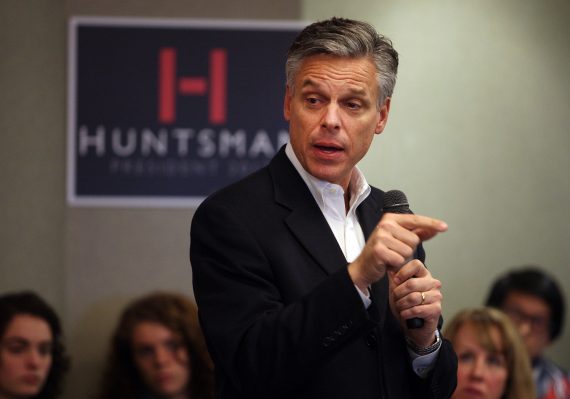
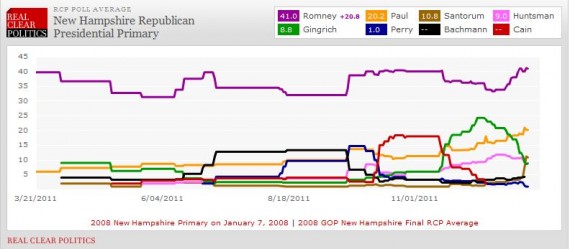

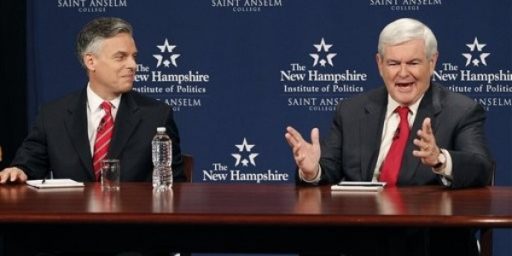
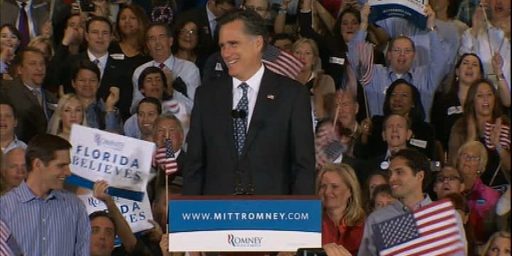
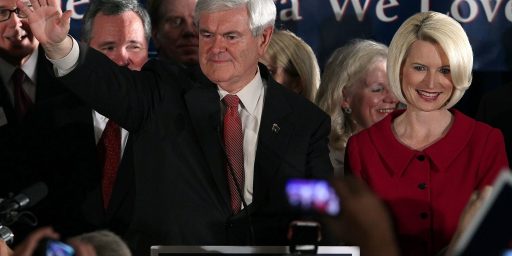
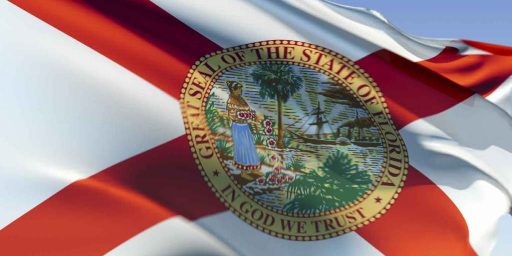

Huntsman is running for ’16.
Yes, Huntsman never should have pointed out that Republicans are absolutely bat-sh*t crazy.
Huntsman had a lot going against him from the get go. First, he’s not really a “not-Romney” in the sense that you are thinking of in that he could be a Romney clone. While I will agree that he has experience, the type of experience that he has outside of a governorship is not the sort that counts among the electorate. Trade representatives are career civil service types, not leaders, and ambassadorships go to rich donors, close friends, and former child movie stars–again, not the people who we look to when electing President.
While you see the China appointment as honorable and positive, remember that he refused the “real” President when Dubya asked him to go, but said “yes” when that Kenyan-marxist-socialist-Islamic-shaira law-radical-who-shouldn’t-even-be-President-at-all-jihadist Obama asked him. Why should good, loyal ‘Murkins–particularly conservative ones–support someone such as him?